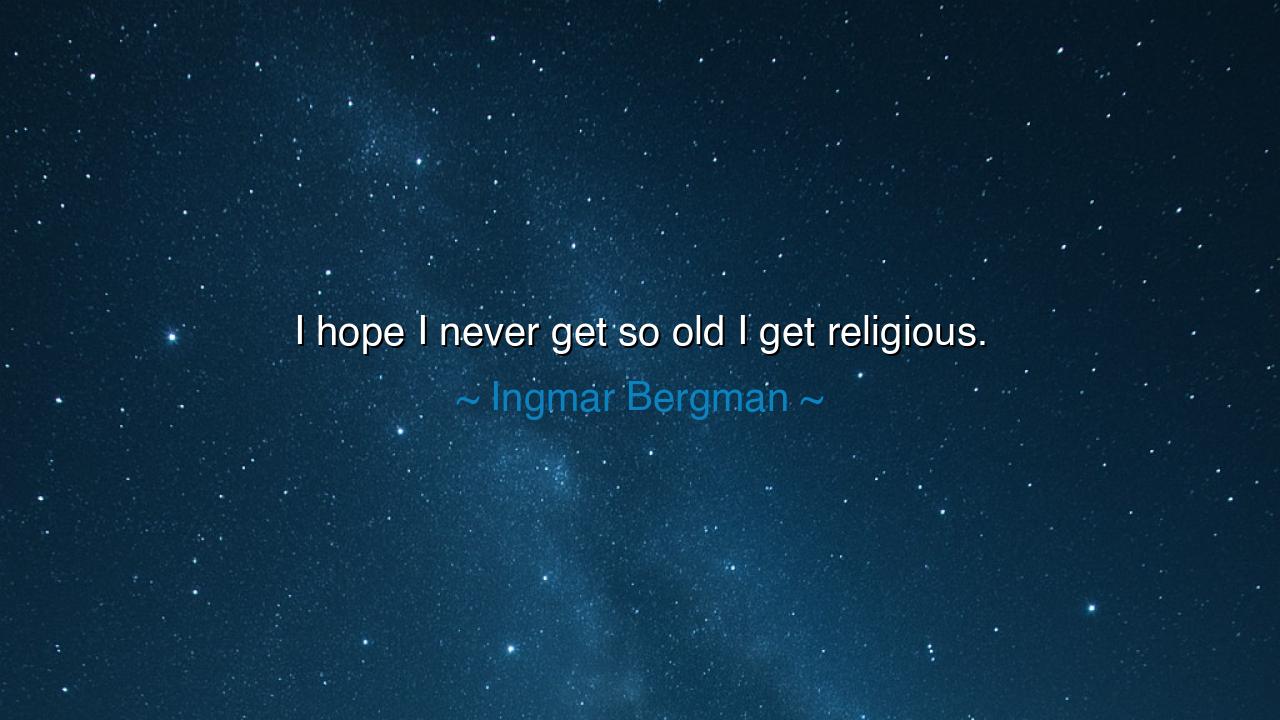
I hope I never get so old I get religious.






“I hope I never get so old I get religious.” Thus spoke Ingmar Bergman, the Swedish filmmaker whose art plumbed the depths of faith, despair, and the silent struggle of the human soul. His words, though sharp and ironic on the surface, conceal a profound reflection on the nature of belief and authenticity. In this sentence, Bergman confronts one of the most ancient fears of mankind: that as the body ages and death draws near, one might cling to religion—not out of truth or love, but out of terror. His wish was not to live without meaning, but to live honestly, to face life and death with unflinching eyes, without retreating into false comfort.
When Bergman says, “I hope I never get so old I get religious,” he speaks not as a man of mockery, but as one who has wrestled with God’s silence. Raised in the shadow of a stern Lutheran father, he knew religion not as a cradle of peace, but as a burden of guilt and fear. The God of his youth was a watcher, a judge, a presence both majestic and merciless. As Bergman grew into an artist, he did not reject the idea of the divine outright—he sought it, questioned it, portrayed it in his films with aching intensity. Yet he feared the kind of religion that arises not from conviction but from desperation—the late, frightened surrender of those who seek certainty when courage fails. To him, such faith was not illumination but escape, not devotion but denial.
The origin of this quote lies in Bergman’s lifelong dialogue with the sacred and the profane. His films—The Seventh Seal, Winter Light, Through a Glass Darkly—are meditations on faith’s fragility and the torment of the human spirit before the silence of the heavens. He was a man haunted by the absence of God, yet unwilling to fill that absence with illusion. In this way, his defiance was not against holiness, but against hypocrisy. He did not wish to be “religious” in the conventional sense—bound by dogma or comforted by borrowed answers. He longed instead for truth, whatever form it might take, even if that truth brought solitude or pain. For Bergman, to grow old in dignity was to meet death with the same integrity with which one had lived—to remain awake, questioning, and real.
There is a story that mirrors Bergman’s sentiment in the life of Albert Camus, the French philosopher who also struggled with faith and meaning. Camus, like Bergman, rejected the idea of a God who allowed the world’s suffering to exist, yet he could not dismiss the human longing for transcendence. He once said, “I would rather live my life as if there is no God and die knowing there is one, than live as if there is one and die to find there is not.” His words echo Bergman’s, for both men sought a morality of honesty—a courage that does not rely on divine reward. They believed that true integrity lies not in fear of punishment or hope of heaven, but in facing the abyss and still choosing compassion, creativity, and love.
Bergman’s quote also carries a warning for all generations: beware of faith born from fear. When man turns to religion only when his strength fails, he has misunderstood the divine. True faith, if it exists, must arise not from fear of death but from love of life. It must be chosen in the light, not in the shadow of despair. Bergman feared that in old age, surrounded by mortality, the mind grows fragile and the heart grows nostalgic—that one might turn to religion not because one finds God, but because one cannot bear to face the void. His prayer, paradoxically, was a kind of faith in itself—a faith in truth, a faith in courage, a faith in the human spirit’s capacity to endure without illusions.
The lesson here is not to reject faith, but to purify it. Whether you believe in God or not, let your belief—or your unbelief—be honest. Do not borrow convictions out of fear or convenience. If you are to seek the divine, seek it now, in the strength of your youth and the clarity of your mind. And if you cannot find it, then live with reverence for truth, for beauty, for the mystery of existence. Live so that when your final hour comes, you can meet it not with trembling, but with peace born of integrity. For religion that begins in fear dies with it, but truth endures beyond the grave.
So, my child of thought and fire, remember this: to grow old is inevitable, but to grow honest is a choice. Do not wait for death to make you spiritual; let every day of your life be a conversation with meaning. Stand before the unknown as Bergman did—questioning, trembling, yet unafraid. Seek no false comfort, for truth is comfort enough. And if you live with eyes open and heart awake, you may find, as Bergman perhaps did in his final silence, that even in the absence of religion, there is still something sacred—the courage to face the void, and the quiet grace of a soul that has dared to look into the darkness and still love the light.






AAdministratorAdministrator
Welcome, honored guests. Please leave a comment, we will respond soon